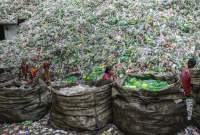Support strong Canadian climate journalism for 2025
In the last decade, abating and preventing plastics pollution has become a major global concern across the full spectrum of our societies. In response, the UN Environment Assembly (UNEA), a gathering of the world’s environment ministers which takes place once every two years at the headquarters of the UN Environment Program (UNEP) in Nairobi, agreed in 2022 to launch an intergovernmental negotiation committee process (INC) to develop an international legally binding instrument on plastic pollution, covering the full life cycle of plastics. Often referred to as the “Global Plastics Treaty,” this potential agreement could be one of the most significant environmental pacts in history.
The growing tide of plastic pollution needs to be overturned urgently. Half of all plastics ever manufactured were produced in the last two decades, and production continues to rise at an alarming rate, from 2.3 million tons in 1950 to 448 million tons in 2015. Plastics, especially single-use items, have harmful and lasting impacts on the environment as well as on human health. In fact, recent studies have confirmed that the toxic chemicals and additives used and released in their production and disposal are ending up in our food, our bodies and our babies. Micro and nanoplastics are also now being implicated in a host of health deficits and disorders, including heart attacks and Parkinson’s disease.
Unless governments take action to control and restrict their production, the amount of plastics is expected to double by 2050, with irreversible pollution on land, air and waters, including the ocean. By agreeing on effective reduction measures, the world can begin to cut back on plastic’s significant contributions to the climate crisis, its global toxicity debt and its harm to biodiversity and human health.
The INC has already met three times between November 2022 and November 2023, and it is to meet again twice this year, in Ottawa from April 23 to April 29, and in Busan, Republic of Korea, in November. The goal is to adopt the “Global Plastics Treaty” by the end of 2024.
However, as the talks continue to unfold, gaps and disagreements between basically two different approaches to the treaty have emerged. A High Ambition Coalition (HAC) made up of 65 countries says — although not loudly enough —that it wants the treaty to address the proliferation of plastics from production to disposal.
In contrast, a smaller group of “like-minded countries,” which includes Saudi Arabia, Bahrain, Cuba, Iran and Russia, are opposed to any consideration of a cap on plastics production and are actively blocking any outcome that would go beyond the mere management of plastic waste.
It is widely thought that the main motivation of this group of “spoiler” countries is to protect the interests of (their) industries whose main business consists of extracting and processing fossil fuels, plastics’ main raw material. Realizing that the days of unchecked combustion and use of fossil fuels are numbered, they are trying to prevent and contain any restrictions on plastics production for the coal and oil companies to stay alive and profitable amidst escalating global demands for decarbonization.
The draft treaty text produced so far, tabled for the fourth session of the INC in Ottawa, runs up to 70 pages with so many opposing and contradicting options that it is almost impossible to envisage how government ministers can resolve and agree to the draft in its current form.
The disagreement between the HAC and the spoilers has taken such proportions that in its last three meetings, the INC has been unable to reach an agreement on the rules of procedure governing the way it can make decisions. The spoilers argue that decisions on substantive matters should be taken by consensus, which would inevitably bring the treaty down to the lowest common denominator or even to a failure to adopt it. In contrast, the countries that want the treaty to address the full life cycle of plastics are insisting that decisions be taken by a simple or qualified majority vote, thus respecting the wishes of the majority.
Consensus is always desirable whenever possible to bind the international community in shared visions, measures and targets. However, when opportunities for consensus are exhausted due to the actions of a minority group, majority voting is important to prevent paralysis. In the worst-case scenario, if they wish to detach themselves from the views of the majority, a few countries could always express their reservation to one or a few provisions in the treaty or wait until they are in a position to endorse and ratify it. What is unacceptable, however, is to hold the entire international community hostage to the will of a few, which is the worrying dynamic that the world has witnessed in the earlier stages of negotiations.
A comprehensive treaty to reduce, prevent and abate the proliferation of plastics in the environment must ensure that the decision-making process upholds the original mandate from UNEA. Any interpretation that excludes extraction and production processes from the scope of the potential treaty would fail to grapple with the full reality of the plastics cycle, and therefore fail to mitigate its most pernicious human, social and environmental impacts.
For environmental NGOs and civil society groups that have a shared interest in ending the plastic pollution crisis, this would be a missed opportunity with disastrous consequences for the planet.
Von Hernadez is the co-ordinator of Break Free from Plastic (BFFP), a global movement comprising more than 3,500 organizations and representing millions of supporters worldwide who share the common vision of a future free from plastic pollution.






Comments
Cuba doesn't extract or process fossil fuels. What's it doing in the "spoiler" group?
I have the same question. Are they still siding reflexively with Russia, which does have an economic motive?